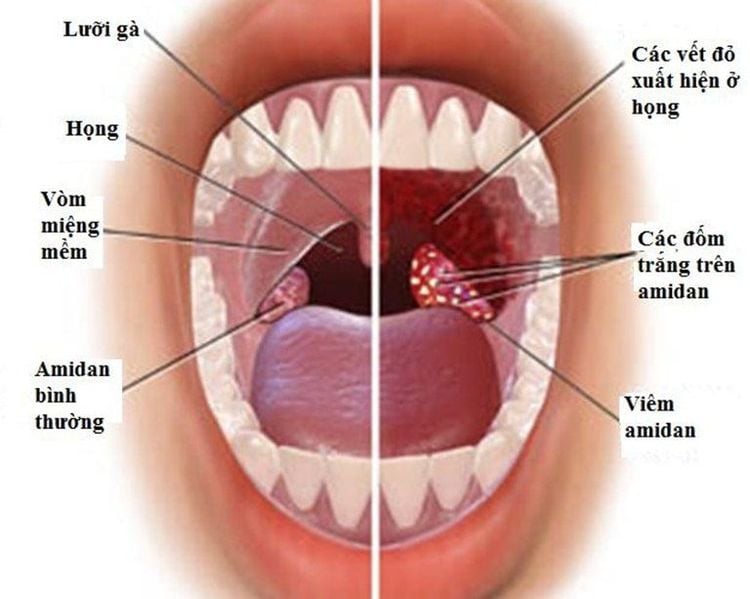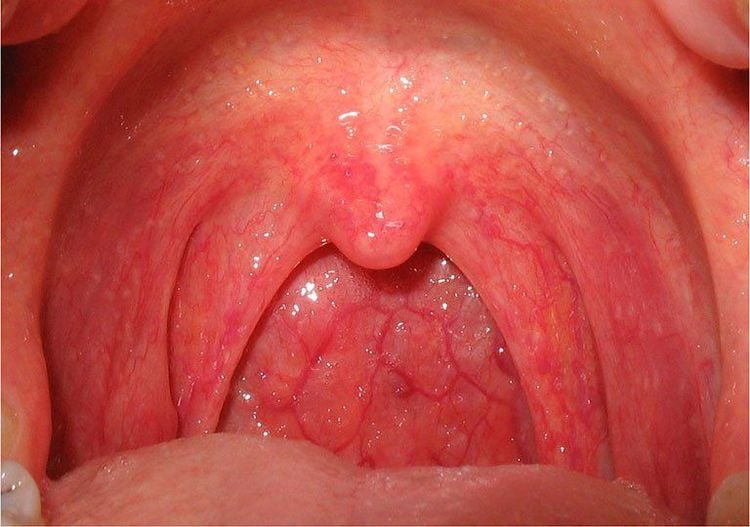There are many causes of sore throat with swollen glands. Therefore, when you see any abnormal signs and cannot find the cause, you should go to a medical facility for examination and treatment to avoid dangerous complications.
1. Basis of Infection
A sore throat accompanied by swollen glands is quite common. Lymph nodes, located in the neck and other parts of the body, serve as storage for white blood cells which function to filter germs and respond to infections.
A sore throat and swollen glands often occur together. This is because when experiencing a sore throat, the body may be in a state of illness and the body's lymph nodes are reacting to these factors.
The nose and throat are among the primary entry points for germs to enter the body. For this reason, these organs are frequently subjected to minor infections. In response, the body produces and transmits signals to white blood cells to eliminate the pathogens. Lymph nodes swell when they are filled with white blood cells. The human body has many lymph nodes (a total of 600 in various locations throughout the body). Lymph nodes often swell around any area of the body that is sick or injured.
The human throat has three main areas that can become sore, specifically:

Larynx: Also known as the voice box, the larynx is used for breathing and preventing foreign objects from entering the trachea.
Throat: This is the passageway from the mouth and nose to the esophagus and trachea.
Typically, a sore throat and swollen glands (lymph nodes) are not symptoms of a serious problem. They can simply be classic signs of the common cold. However, there are many other potential causes. Consult a doctor if you have any of the following signs:
Swollen glands for more than two weeks
Swollen glands accompanied by weight loss
Night sweats or fatigue
Swollen glands near the collarbone or lower neck.
2. 10 causes of sore throat with swollen glands
2.1. Common cold
The common cold is an upper respiratory infection. Along with a sore throat, a cold can cause:
- Runny nose
- Fever
- Nasal congestion
- Cough
Children are more likely to catch colds, but adults can still get several each year. Colds are caused by viruses, so they cannot be cured with antibiotics.
Adults can take over-the-counter (OTC) medications to treat symptoms, but most cold medicines are not safe for young children. A cold can become dangerous if you develop serious complications such as difficulty swallowing or shortness of breath. See a doctor if your cold causes breathing difficulties or if you have other serious symptoms such as severe sore throat, sinus pain, or earache.

2.2. Flu
Like the common cold, the flu is a common viral respiratory infection. Flu viruses are different from the viruses that cause the common cold. However, their symptoms are very similar.
Typically, the flu develops more suddenly and the symptoms are more severe than the common cold. Sometimes, antiviral medications can treat the flu by reducing the activity of the virus, but it often goes away on its own. At-home treatment for the flu usually includes pain relievers, plenty of fluids, and rest. People at risk of complications from the flu include young children, older adults, and anyone with an underlying health condition that weakens the immune system.
If your flu symptoms become severe and you may be at risk of complications, see a doctor immediately. However, it is very rare for the flu to cause serious health problems and death.
2.3. Sore throat
The most common bacterial throat infection is streptococcal pharyngitis, also known as strep throat. This condition is caused by the bacteria Streptococcus pyogenes. Strep throat can be difficult to distinguish from the common cold.
If you have a severe sore throat and fever, see a doctor for prompt diagnosis and treatment. Strep throat is diagnosed with a swab to test for the presence of streptococcal bacteria. Additionally, antibiotics are required to treat strep throat.

2.4. Ear infections
Sore throat, swollen neck glands, and ear infections often occur together. This is because a sore throat and nasal congestion can cause or be related to an ear infection. Another reason is that the presence of an ear infection can cause the glands to swell and the pain response can spread to the throat and mouth.
Ear infections are common but should be treated by a doctor. A doctor will diagnose if the infection is likely viral or bacterial and recommend the appropriate treatment. Ear infections are usually not serious, but in severe cases, they can cause long-term problems such as brain damage and hearing loss.
2.5. Measles
Measles is a highly contagious viral disease. It is more common in children than adults. Symptoms include:
- Fever
- Dry cough
- Sore throat
- Characteristic measles rash
Measles can usually be prevented with the measles vaccine. However, measles should be treated by a doctor as it can have serious complications.

2.6. Infected teeth
Similar to ear infections, the location and presence of an infection in a tooth can cause a sore throat and swollen glands. Lymph nodes swell in response to the infection, and you may experience pain throughout your mouth and throat.
When a tooth becomes infected, it requires urgent medical attention to prevent serious complications. Especially since oral health is crucial for everyday life.
2.7. Tonsillitis
Any inflammation of the tonsils, whether caused by a virus or bacteria, is called tonsillitis. You have several tonsils, and they all form a ring around the back of your mouth and upper throat area. Tonsils are lymphatic tissues and are also part of the immune system. Their components react quickly to any germs that enter your nose or mouth.
If your tonsils become so sore or swollen that it’s difficult to breathe, seek emergency medical help. Viral tonsillitis can usually be treated at home with plenty of fluids, rest, and pain relievers. But treating bacterial tonsillitis will require antibiotics.
If the pain persists, or you have a fever, or you suspect you have strep throat, you will need a doctor 1 to diagnose and treat it appropriately

2. 8. Mononucleosis
Infectious mononucleosis is a common infectious disease. However, it's less contagious than the common cold. It often occurs in teenagers and young adults. Symptoms of the disease include:
- Fatigue
- Sore throat
- Swollen glands
- Swollen tonsils
- Headache
- Rash
- An enlarged spleen
You should see a doctor if these symptoms don't improve on their own. Moreover, the disease can potentially lead to serious complications, including problems with the spleen or liver. Less common complications include problems with the blood, heart, and nervous system.
2.9. Injury
Sometimes, a sore throat isn't caused by an illness but by an injury. Your body's glands can still become swollen as your body repairs these injuries. Throat injuries can include:
- Voice overuse
- Consuming hot foods or drinks
- Heartburn and gastroesophageal reflux disease (GERD)
- Accidents that can harm the throat
You should see a doctor if the pain is severe or if it interferes with your daily life.

2.10. Lymphoma or HIV
Rarely, a sore throat and swollen lymph nodes can be signs of a very serious condition. For example, they could be symptoms of cancer, such as lymphoma, or even a solid tumor that has spread to the lymphatic system. Alternatively, they could be symptoms of the human immunodeficiency virus (HIV). However, in these specific cases, the symptoms may align with some of the aforementioned causes and may be accompanied by other rare symptoms like night sweats, unexplained weight loss, and other infections.
People with HIV sometimes experience recurrent sore throats due to a weakened immune system. Likewise, lymphoma is a type of cancer that directly attacks the lymphatic system. Either of these conditions requires diagnosis and treatment by a doctor. If you experience recurrent symptoms or something that just feels off, see a doctor for timely treatment.
If you have any unusual symptoms or persistent sore throat and swollen lymph nodes, you should visit a medical center for an examination, imaging tests to determine the cause, and timely treatment.
To arrange an appointment, please call … or make your reservation directly HERE. You may also download the MyVinmec app to schedule appointments faster and manage your reservations more conveniently













